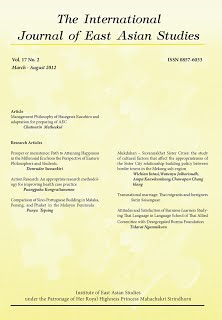Mukdahan – Suvannakhet Sister Cities: the study of cultural factors that affect the appropriateness of the Sister City relationship-building policy between border towns in the Mekong sub-region
Keywords:
Mukdahan – Suvannakhet, sister city, cultural factorsAbstract
Background: Since 1990, Asian Development Bank has funded the initiation of the economic cooperation among the six Greater Mekong countries, including Cambodia, China, Myanmar, Vietnam, Laos and Thailand, under the policy of “The Greater Mekong Sub-regional Economic Cooperation: GMS-EC”. This policy has resulted in various forms of cooperation in the region. Another important framework is the Ayeyawady - Chao Phraya - Mekong Economic Cooperation Strategy (ACMECS) which aims to bridge the economic development gaps or differences and creates sustainable cooperation between member countries. Under the cooperation frameworks with that aim in mind, many projects have been implemented and one of them is the development of the relationship between different countries in the form of Sister Cities, which is an international city twinning that aims to achieve a mutual development goal.
Objective: To present an explanation for the appropriateness of the relationship-building policy at city level in the form of Sister Cities between border cities in the Mekong sub-region. This article will use the Sister Cities of Thailand's Mukdahan andSavannakhet of Lao People's Democratic Republic, which are two border cities in the Mekong sub-region as a case study.
Results: cultural factors were important factors that made Sister City relationship-building policy appropriate for the area. This was because when people shared the same identity, they would also feel that they shared a common fate and had the ability to determine their shared value. This identity came from cultural factors, and these cultural factors are the foundations that led to the success of the implementation of the relationship-building policy that aimed to enhance better understanding between cities, which would in turn, resulted in economic, social and cultural cooperation.


